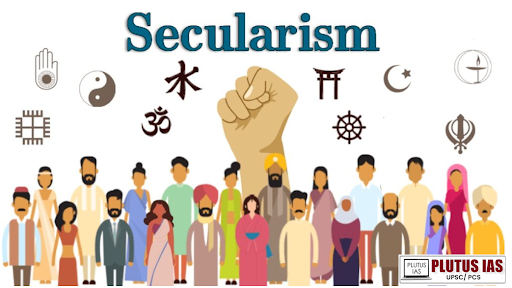26 Nov Secularism: Inalienable Pillar of the Indian Constitution
This article covers “Daily Current Affairs” and topic details of Secularism and Socialism: Inalienable Pillars of the Indian Constitution
Syllabus mapping:
GS-2: Indian polity: The basic features of the Indian Constitution
For Prelims:
What is the Indian Secularism? various constitutional provisions related to secularism in India.
For Mains:
What are the features of Indian secularism and its significance in India and what ways to uphold the principle of secularism?
Why in the News?
The Supreme Court of India recently upheld the inclusion of the terms “secular” and “socialist” in the Preamble of the Constitution, declaring them an inalienable part of its structure. The decision came while dismissing petitions filed in 2020 that challenged their addition through the 42nd Constitution Amendment Act, 1976. The petitioners argued that the terms were inserted retrospectively and alleged they restricted economic policy choices and contradicted the Constituent Assembly’s intentions. However, the Court reaffirmed Parliament’s authority to amend the Constitution under Article 368 and emphasized its status as a living document, adaptable to evolving societal needs.
Secularism in India:
Definition: According to the Apex Court, Secularism signifies a Republic that ensures equal respect for all religions, fostering harmony and non-discrimination in a multi-faith society.

Features of Secularism in India
Equal Respect for All Religions: The State treats all religions with equal regard and ensures no discrimination based on faith.
No State Religion: India has no official religion, maintaining a neutral stance towards all faiths.
Freedom of Religion: Articles 25 to 28 of the Constitution guarantee the right to profess, practice, and propagate any religion.
Non-Discrimination: Articles 14, 15, and 16 prohibit discrimination on religious grounds and guarantee equality before the law.
Protection of Religious Minorities: Ensures rights and safeguards for religious minorities to preserve their cultural identity and practices.
Significance of Secularism in India
Unity in Diversity: Promotes harmony in a multi-religious society, ensuring peaceful coexistence. Indian constitution guarantees equal rights to all citizens of India irrespective of his/her religion.
Safeguards Democratic Values: Upholds principles of equality, liberty, and fraternity. The secularism in India treats every religion in India as an equal religion
Prevention of Communal Conflicts: Limits religious interference in state matters, promoting national integration.
Constitutional Ethos: Reflects the fundamental principles of the Indian Constitution, fostering an inclusive society.
Dynamic Interpretation: India has evolved its secular model, balancing freedom of religion with the State’s responsibility to uphold equality and justice for all.
Challenges to Indian Secularism
1. Religious Polarization: Increasing communal tensions and political exploitation of religion undermine secular values. Growing divide between communities due to misinformation and prejudices.
2. Political Misuse of Religion: Religion is often used as a tool for vote-bank politics, leading to biased governance.
3. Rise of Religious Extremism: Fundamentalist groups and intolerance towards differing beliefs challenge the secular ethos.
4. Inequality in Religious Practices: Unequal state intervention in religious practices and institutions creates a perception of bias. Issues like personal laws for different communities lead to debates on uniformity and fairness.
5. Judicial Interpretation Challenges: Conflicting interpretations of secularism sometimes result in ambiguities, affecting policy-making.
6. Social Exclusion: Marginalization of certain communities despite constitutional safeguards highlights implementation gaps.
7. Media and Misinformation: Media narratives and fake news often exacerbate religious tensions, creating challenges for secularism.
Ways to Uphold the Secular Principle of the Indian Constitution
1. Government Responsibility: Impartial Governance: The government must act impartially, upholding the law and ensuring that no religion is favored or discriminated against in public policy or administration. This ensures equal treatment for all citizens.
2. Judiciary: Protecting Minority Rights: The judiciary should actively protect the rights of minorities through prompt and fair decision-making. Recent Supreme Court guidelines, such as on “bulldozer justice,” set a positive precedent for safeguarding constitutional values of justice and equality.
3. People’s Role: Fostering Brotherhood: Every citizen has the fundamental duty, as outlined in the Constitution, to promote fraternity, respect for diversity, and the brotherhood of all individuals, regardless of religion, ensuring social harmony.
4. Fourth Pillar of Democracy: Responsible Media: The media must be responsible in its role, avoiding the spread of misinformation or divisive narratives related to specific religious or social communities. Media should promote understanding, tolerance, and secularism.
5. Political Parties: Reducing Polarization: The effective implementation of the Representation of the People Act, 1951 (RPA) is essential to curb the use of religion in politics. Political parties should focus on development and governance, not on religious polarization for electoral gain.
6. Religious Leaders: Promoting Interfaith Dialogue: Religious leaders must engage in interfaith dialogues, promoting mutual respect and understanding. This fosters a culture of peace and tolerance, ensuring that religion remains a private matter, not a source of division.
Conclusion
The inclusion of “secular” and “socialist” in the Preamble reflects India’s commitment to ensuring equality among its diverse population while promoting social welfare. The Supreme Court’s interpretations reinforce these values as essential components of constitutional governance.
Download Plutus IAS Current Affairs ENG MED 26th Nov 2024 pdf
Prelims question:
Q.1. Which of the following statements best reflects the concept of secularism as enshrined in the Indian Constitution?
1. The state has the authority to promote a particular religion.
2. All religions are treated equally, and the state does not favor any religion.
3. Religious laws supersede civil laws in matters of personal status.
4. The state can intervene in religious practices to maintain public order.
Select the correct answer using the code given below:
A. Only one
B. Only two
C. Only three
D. All four
ANSWER: B
Mains Question:
“The recent Supreme Court verdict stated that Secularism is part of the constitution” In this context discusses the features of secularism in India. (Answer in 150 words)




No Comments